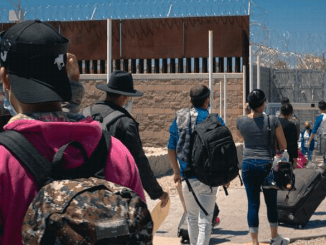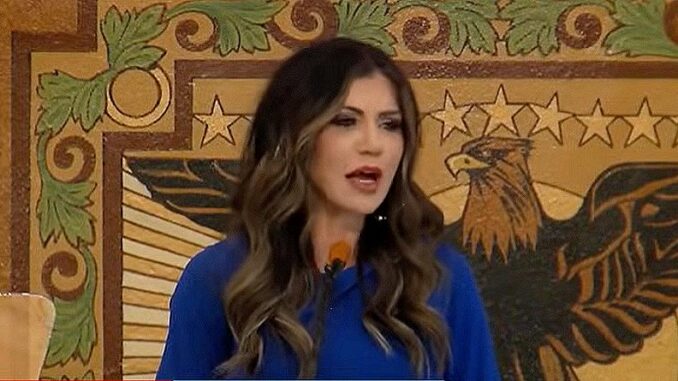
FORT YATES, North Dakota, April 10, 2024 (ENS) – The Standing Rock Sioux Reservation spans the border between the states of North Dakota and South Dakota, but as of now the Governor of South Dakota cannot enter the reservation – she is not welcome.
The Standing Rock Sioux Tribal Council has voted to banish South Dakota Governor Kristi Noem from its reservation after public comments she made in March that tribal leaders call “racially-charged” and “disparaging” of tribal communities living in the state she governs.
The people of Standing Rock, often called Sioux, are members of the Dakota and Lakota nations, terms that mean “friends” or “allies,” the Standing Rock Sioux Tribe says on its website. The Standing Rock Sioux, SRST, join two other Lakota tribes in prohibiting the Republican governor from their tribal lands.
The Oglala Sioux Tribe and the Cheyenne River Sioux Tribe have also banned Governor Noem from tribal lands after comments she made last month that the tribal leaders called “defamatory.”
Governor Noem claimed that tribal leaders in the state allow the presence of murderous Mexican drug cartels, and that she wants a full audit of tribal spending of federal dollars.
“I call on all our tribal leaders to banish the cartels from tribal lands,” said Noem at a bill signing event in March. “The cartels instigate drug addiction, murder, rape, human trafficking, and so much more in tribal communities across the nation, including in South Dakota. I will work with you to sign Law Enforcement Agreements to immediately assist you, respect your sovereignty, and uphold tribal law.”
Standing Rock Sioux Chairwoman Janet Alkire pushed back, “Governor Kristi Noem’s wild and irresponsible attempt to connect tribal leaders and parents with Mexican drug cartels is a sad reflection of her fear-based politics that do nothing to bring people together to solve problems.”
Oglala Sioux Tribal President Frank Star Comes Out said, “It is with great disappointment that the Oglala Sioux Tribe once again has to respond to inflammatory and disparaging remarks about our reservation communities and tribal leadership made by Governor Kristi Noem.”
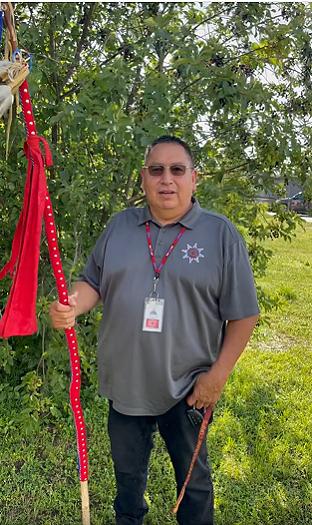
At an event on March 13, the tribal leaders say, she disparaged Native American parents, who Noem claims are to blame for poor performance in the state’s schools, along with tribal leaders.
Meanwhile, South Dakota had the lowest public school teacher pay rate in the 50 United States in 2023, according to World Population Review.
The governor made the inflammatory comments during a town hall meeting in the town of Mitchell, South Dakota where she signed two education bills into law, and at a later town hall meeting in the town of Winner.
In Winner, the governor said, “We’ve got some tribal leaders that I believe are personally benefitting from the cartels being here, and that’s why they attack me every day,” the South Dakota Searchlight reported.
In response, Star Comes Out reminded the governor that South Dakota’s high drug-trafficking area is in the state’s most populous city, Sioux Falls, not on tribal lands.
The Oglala Sioux Tribal Council voted to banish Governor Noem on February 5, for similar remarks she made toward tribal leaders regarding Mexican drug cartels.
On March 27, the Cheyenne River Sioux Tribal Courts upheld the CRST Tribal Council vote banishing Noem from their reservation.
CRST Chairman Ryman LeBeau called the South Dakota governor’s remarks about Lakota students, their parents, and tribal councils “gossip and lies.”
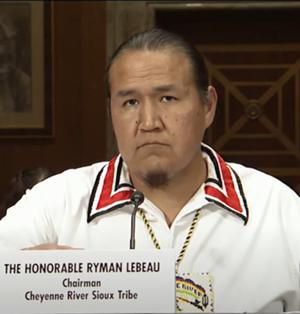
Governor Noem’s statements made on March 13, “perpetuate stereotypes, misconceptions, which are inaccurate and untrue,” LeBeau said.
“According to her Christianity, gossip is a sinful act. As South Dakota’s governor she does not know or understand our issues or successes of our Reservation schools and communities. The governor is out of touch and auditioning for Trump’s vice president for her own personal political gain,” accused the CRST chairman
To date, five Sioux Tribes have demanded an apology from Noem, but the governor has not apologized for her comments.
Instead, on April 3 she called on tribes to ban Mexican cartels from the reservations, and the Republican governor blamed President Joe Biden, a Democrat, for the problem.
Criticizing the Biden Administration for problems at the U.S.-Mexico border, Governor Noem said, “We see the effects of the open border every day. The citizens of South Dakota are less safe because of it. We especially see the impact on our tribal reservations. Mexican drug cartel presence in Indian country is a problem across the nation.”
“I have called on all our tribal leaders to banish the cartels from tribal lands,” Noem said, calling for more federal money for “tribal law enforcement.”
“This is why I am also pushing for an audit of federal funds going to South Dakota’s Native American tribes,” she said.
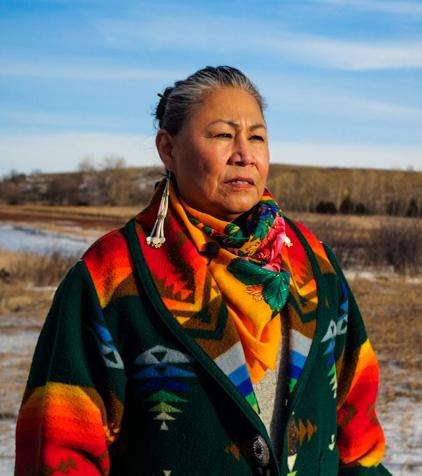
“Rather than embrace Noem’s politics of fear, we call on her to end her attempts to slander tribal leaders and parents,” SRST Chairwoman Alkire said. “Noem should embrace the politics of truth and compassion. We remember who we are every day, and this is why we are a people rich in culture and history.”
Banishment in Indian Country is a rare but serious form of punishment, Alkire explained. Tribal courts have the ability and mandate to uphold banishment resolutions passed by tribal councils. The Fort Laramie Treaty of 1868 specifically states that non-Indians can be excluded from tribal lands by a tribe mentioned in the treaty.
A banished person has a right to be notified, and has the right to an appeal in tribal court.
The State of South Dakota does not have criminal jurisdiction on any of the nine Indian reservations in the state, but it does own land in various parts of each reservation. The amount of property the state controls is unknown. South Dakota does not publish its trust land data, which must be obtained through a public records request.
“It’s not acceptable for Kristi Noem to lie repeatedly, stoke further division, and endanger the people of the sovereign nations which pre-exist the United States and South Dakota, which have illegally annexed and occupied sovereign territory of the Oceti Sakowin,” said Lakota People’s Law Project’s Director Chase Iron Eyes.
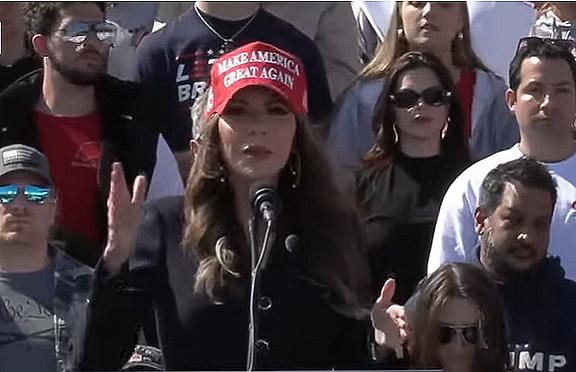
“Noem is now prohibited from entering sovereign territory of Sioux bands and is subject to detention and/or removal if she violates banishment orders,” Iron Eyes said, meaning that the state’s governor is barred from entering more than 10 percent of all the land her state claims is within its ‘borders.'”
This isn’t the first time Governor Noem has been banished by a tribal council. The Oglala Sioux banished Noem “…when she targeted tribes and attempted to thwart legal First Amendment protests against the failed Keystone XL oil pipeline by passing a pair of so-called ‘riot-boosting’ bills in 2019,” Iron Eyes recalled.
He says those bills show Noem’s willingness to clash with tribes, tribal citizens, and their allies who speak out against fossil fuel infrastructure projects adjacent to or crossing tribal lands.
Now, tribal leaders say, she has made it personal.
“Her remarks were made from ignorance and with the intention to fuel a racially based and discriminatory narrative towards the Native people of South Dakota,” Rosebud Sioux Tribal Chairman Scott Herman said in a March 15 statement. “We demand an apology from the governor.”
At the end of March, an uninvited Noem attended a scheduled sacred sites meeting in Rapid City with others from the Governor’s Office. She was not permitted to speak at the meeting, according to several tribal leaders.
Both Oglala Sioux Tribe President Frank Star Comes Out and Cheyenne River Sioux Tribe Chairman Ryman LeBeau issued statements after last Friday’s meetings confirming that the governor did not speak, either at the meeting or with tribal leaders.
Featured image: South Dakota Governor Kristi Noem delivers the 2024 State of the State Address. January 9, 2024, Pierre, South Dakota (Screengrab from video courtesy Government of South Dakota)
© 2024, Environment News Service. All rights reserved. Content may be quoted only with proper attribution and a direct link to the original article. Full reproduction is prohibited.



